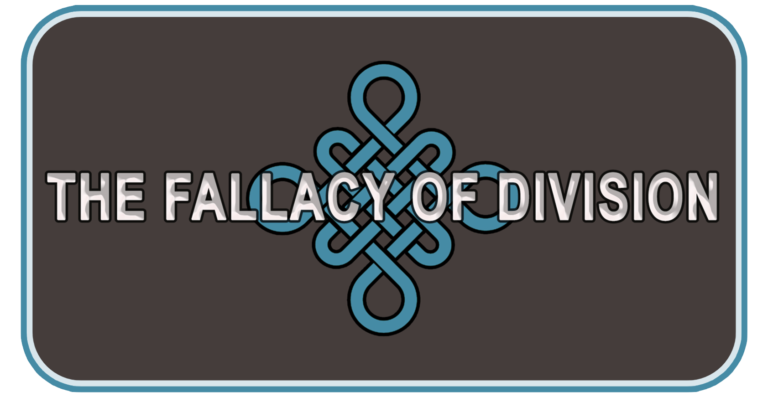
UNDERSTANDING THE FALLACY OF DIVISION
The fallacy of division is an error in understanding caused by overgeneralization. Using mental shortcuts in order to make decisions quickly and efficiently can lead to inaccuracies. Arguments are typically genuine misunderstandings. A constructive way to respond to these disagreements is to identify the fallacy, question the assumption and to provide alternative examples.
Simply understanding the many different types of fallacies will graphically show the illogical thinking caused by by using mental shortcuts and deception. Here are ten well known examples of fallacious reasoning:
1. Ad Hominem (Attacking the person) This fallacy occurs when, instead of addressing someone’s argument or position, you irrelevantly attack the person or some aspect of the person who made the argument
2. Appeal to Authority, believes it’s true based on the blind faith of someone who you greatly admire or respect.
3. Appeal to Ignorance, claim that it must be accepted because no one else can prove otherwise.
4. Bandwagon, claimed to be true or good because many people believe that it is.
5. Circular Reasoning, conclusion is assumed to be correct by answering the question itself.
6. False Analogy, assumption that because they are alike in one way, they are alike in another.
7. False Dilemma, only two choices given as alternatives when more than two exist.
8. Red Herring, when someone uses irrelevant information to distract from the argument.
9. Straw Man, refuting the original point, but really arguing a point that hadn’t been made.
10. Sweeping Generalizations, when a very broad application is applied to a single premise.
If our future depends on the honesty of elected officials and the truth being given by businesses or nonprofits in advertising or practice, then we could be on a very slippery slope. We must have the truth spoken to all of the people all the time. It is just as important that the rich and powerful must hear and act according to the truth.
Hiding behind the above fallacies is one reason why governments, powerful corporations and nonprofits may be failing us. These new laws are being written in many countries including the USA. In acted on October 5th 2023, the Incorporated Societies Act of 2022 came to force. The 2022 Act modernizes the laws and the way societies need to operate. For a time, there will be two Acts in force, which one applies to your society depends on which Act it’s registered under.